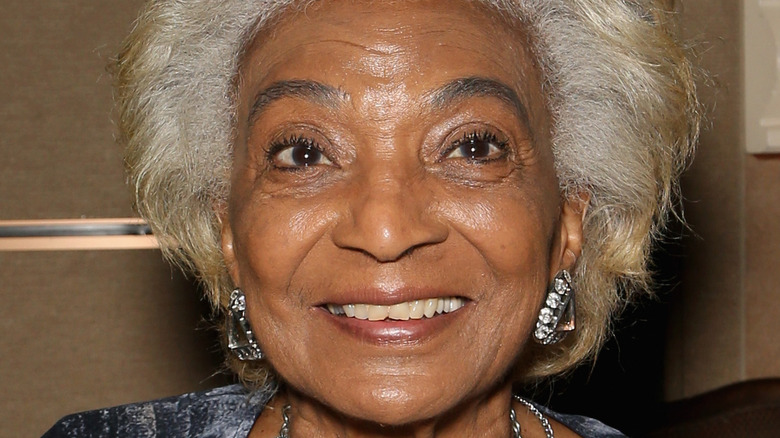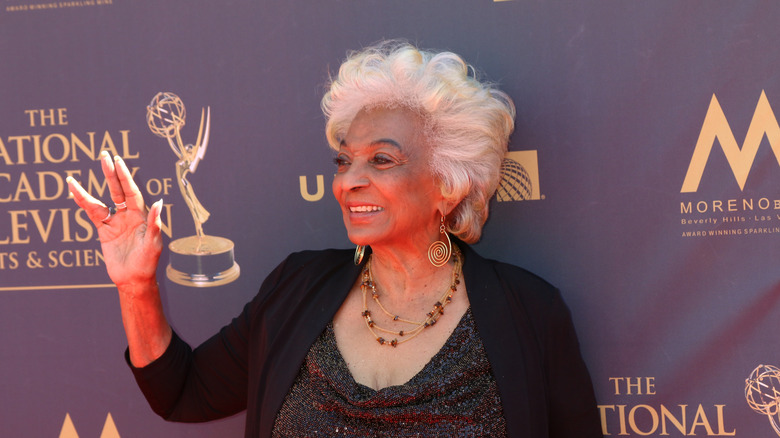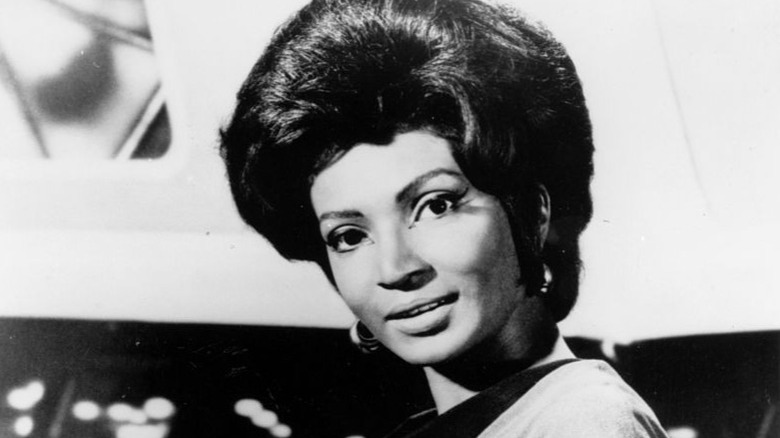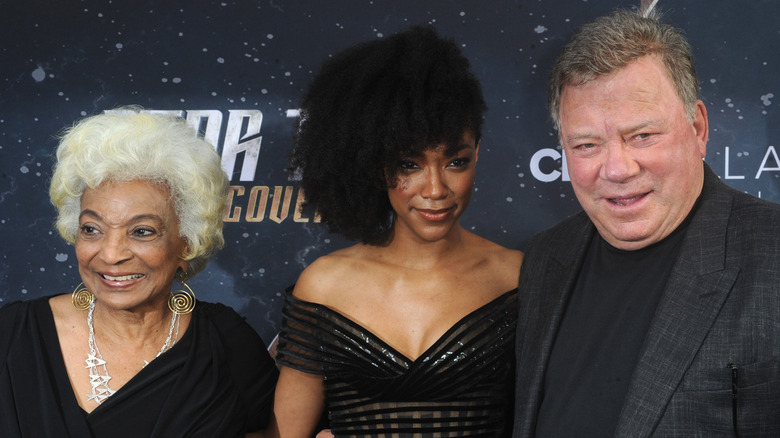The Heart-Wrenching Death Of Nichelle Nichols
We may receive a commission on purchases made from links.
On July 30, the world bid farewell to its leading lady of space, Nichelle Nichols. She was 89. Nichols "succumbed to natural causes and passed away," according to a statement from her son, Kyle Johnson, who posted to the late actor's official Facebook page. Johnson also shared, "Her light however, like the ancient galaxies now being seen for the first time, will remain for us and future generations to enjoy, learn from, and draw inspiration."
Nichols is most known for her role as Lieutenant Uhura in the original "Star Trek" series. Fans of Nichols have responded to the news on social media with tweets about the actress' legacy. Krystina Allen tweeted, "She inspired me to do what I do now. I'm always be grateful for her beautiful legacy."
In the Facebook post, Johnson also shared, "I, and the rest of our family, would appreciate your patience and forbearance as we grieve her loss until we can recover sufficiently to speak further."
Nichelle Nichols' most famous role had significant real-world impacts
Nichelle Nichols was known, above all else, for her landmark role in the original "Star Trek" series (TOS) as Lieutenant Nyota Uhura, whose last name — chosen by Nichols — derives from "freedom" in Swahili, per Red Shirts Always Die (fun fact: she didn't reveal her character's first name until 1987, almost 20 years after TOS ended). From 1966 to 1969, she headed up communications on the bridge of the Enterprise and went on to inspire generations of people across all classes, races, and nations.
Nichols, who always loved space, was NASA's recruitment ambassador from the late 1970s through late 1980s, per Space, when she brought on board Guion Bluford, the first Black astronaut, Sally Ride, the first female American astronaut, and more. Nichols' natural charm and grace (her birth name, in fact, is "Grace") inspired everyone from Martin Luther King Jr., who dissuaded her from leaving "Star Trek" for Broadway (as Nichols states on YouTube) because of what her presence as a Black woman on TV signified, to a young, reformed neo-Nazi whom Nichols recalls thanking her at a convention because, before her, he "never saw anyone besides a white person as a human being" (also on YouTube).
A natural singer and performer who toured with Duke Ellington
Born Grace Nichols in 1932 in Robbins, Illinois, Nichols grew up in Chicago as a natural-born singer and dancer. Nichols caught the eye of Duke Ellington at a performance of hers at age 15 (interview on YouTube) and was recruited to create and perform a ballet for a musical number he'd been working on. Ellington said she had "wonderful talent," and within a couple of years, Nichols toured with the legendary band leader before heading to Los Angeles along her intended path to Broadway.
In L.A., Nichols did some modeling and worked with Gene Roddenberry on his first TV series, "The Lieutenant" (1963-1964). Nichols had no idea she was auditioning for a role with Roddenberry when she went in for the part of Uhura, when she happened to be carrying in her arm a book about African cultures called "Uhuru." As she said on Deseret News, "I took 'Star Trek' because I thought it would be a nice adjunct to my resume, and I'd get to Broadway quicker and as a star."
Nichols wanted to quit after "Trek's" first season to avoid getting stuck, but Martin Luther King Jr. approached her at an NAACP fundraiser at a time when Black people were being "hosed down" because they "wanted to eat in a restaurant." "Star Trek" was the only show King and his wife, Coretta, would allow their kids to watch. That's all it took for Nichols, thankfully, to stay.
A lasting legacy of generosity, warmth, and inspiration
Besides her role as an actor in "Star Trek" — including the original, three-year series, its six subsequent movies, and its animated series (1973-1974) — and her work with NASA as a recruiter, Nichols was a spokesperson for The Kwanzaa Foundation (per Star Trek Library), released a 1994 memoir "Beyond Uhura," and remained heavily involved in the "Star Trek" community throughout her entire life. In a 2018 interview available on YouTube, Nichole described with typical warmth and generosity how she always felt "at home" at conventions, as though she was among family.
As Space says, Nichols had the rare chance to travel with NASA on a high-altitude, eight-hour mission aboard the C-141 Astronomy Observatory as it analyzed the atmospheres of Mars and Saturn. Nichols was also the subject of a 2019 documentary, "Woman in Motion," which chronicled her impact on recruiting a diverse array of individuals into NASA. "She has this charisma and energy about her that not only embraces you but engages you, and you hang on her every word, whether she is talking or singing," director Todd Thompson said on SyFy.
In her late life, Nichols was sadly embroiled in a lawsuit against her former manager, Gilbert Bell, who was accused of living on her property, stealing money from her, elder abuse, and other allegations, as Gizmodo explains. This lawsuit was spearheaded by Nichols' son, Kyle Johnson, who survives her.
In Johnson's Facebook post, he shared, "Her services will be for family members and the closest of her friends and we request that her and our privacy be respected."



